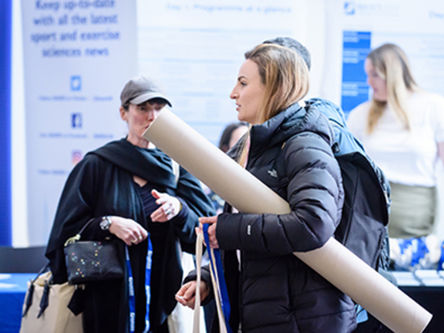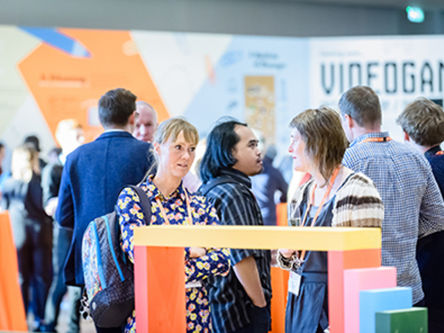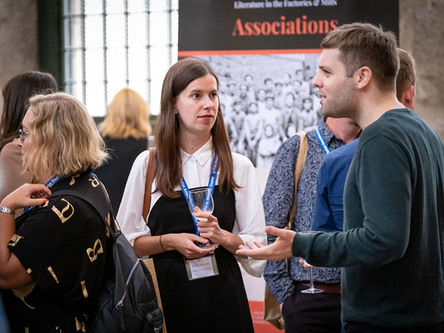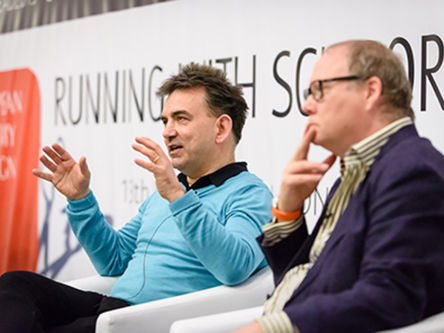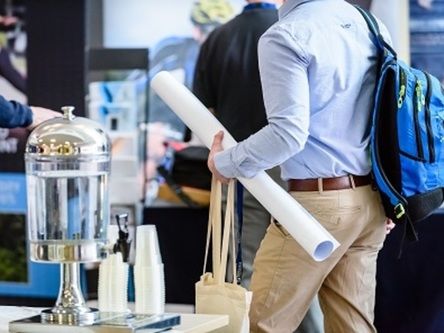Fast Facts
Dates - 14-16 June 2017
Venue - Dalhousie Building, University of Dundee
Delivery partners - PAMIS, University of Dundee and Dundee City Region Convention Bureau
Attendance - 187 delegates from 9 countries
Impact on the local economy - £244,446.00
Promoting Inclusion Transforming Lives 2017
The Promoting Inclusion – Transforming Lives International Conference 2017 aimed to bring together groups of people to engage in lively debate and look for solutions to make communities across the globe more inclusive. The organisers hoped that by working together, they could consider how to transform the lives of some of the most excluded people within our communities, including those with profound and multiple learning disabilities, dementia and complex physical disabilities.
Originally conceived as a 25th anniversary celebration of charity PAMIS (Promoting A More Inclusive Society), the conference quickly grew in scope and it wasn’t long before the University of Dundee became involved in making arrangements.
One of the conference’s unique strengths was a roster of delegates not just from academia, but from all walks of life. Policy makers, town planners, academics, families and people with disabilities were all brought together to look for a way forward.
The conference was organised by PAMIS chief executive Jenny Miller and PAMIS volunteer co-ordinator Lesley Gray, alongside Professor Divya Jindal-Snape, professor of education, inclusion and life transitions and director of the Transformative Change: Educational and Life Transitions Research Centre at the University of Dundee.
Throughout the organisation process, Dundee City Region Convention Bureau (DCRCB) provided invaluable support and guidance.
Ms Miller says, “DCRCB really supported us throughout the whole process. We couldn’t have run the conference without them – it would have been a nightmare! They helped us put everything down on paper, made us move rapidly and really gave us confidence throughout the whole process. We held regular meetings and they helped us expand the programme with evening receptions and dinners to help draw delegates to Dundee.”
Prof Jindal-Snape adds, “DCRCB was very proactive. They were the ones who kept us on track: holding meetings, and ensuring action points were addressed. They were as passionate about the conference as if it was their own. Without them, organising the conference would not have been easy.”
Why Dundee?
For a conference promoting inclusion and accessibility, having an accessible venue was key to the conference’s success. Although PAMIS and the University of Dundee are both headquartered in Dundee, they were not tied to the city out of a sense of duty. Rather, by looking across the country, they discovered that Dundee was actually best suited for their needs.
Ms Miller explains, “We had to have an accessible venue and there aren’t many of those in Scotland. The Dalhousie Building at the University of Dundee is a very accessible building – it has a Changing Places toilet, which are designed to meet the needs of people with complex care requirements. It really was the perfect venue.”
“Another key attraction for holding the conference in Dundee was the support offered by DCRCB. They were good at connecting us with different organisations and had a real commitment not just to helping us put together a world-class conference, but also to supporting our vision that Dundee should be as inclusive a city as possible.”
To add to the accessibility of the conference, DCRCB also helped to arrange a number of ways for delegates to get to Dundee. Ms Miller says, “DCRCB’s help in securing additional transport options ensured as many delegates as possible could attend the conference. Whether arranging a special rate for those flying to Dundee Airport, or putting on complimentary transfers from Edinburgh Airport, it enabled delegates a range of transport options which they appreciated.”
Alongside traditional keynote speeches, workshops and panel discussions, the conference programme took allowed delegates to explore more of Dundee and Angus, including at a civic reception with the Lord Provost Ian Borthwick, a conference dinner at Fingask Castle and an art exhibition held in the Dalhousie Building.
DCRCB helped to organise transport to these evening events which were appreciated by the delegates, many of whom had never visited the area before. Prof Jindal-Snape says, “We got really good feedback from delegates about some of the more unusual events, including the High School of Dundee’s children’s signing choir and the art exhibition at the civic reception. They were a really powerful addition to the conference.”
Beyond The Conference
Like any good conference, the ideas discussed in keynote presentations and workshops led to passionate discussions and the development of interdisciplinary work across the globe.
Prof Jindal-Snape says, “There was a lot of networking and potential collaborations discussed throughout the conference. I personally have been contacted about the project I presented there, and I know that others have been communicating too. I have never been to a conference where people were so open to share their ideas before.”
In fact, one delegate commented that during the conference they discussed “setting up a collaborative international network to take forward themes from the conference, not least the Changing Places Toilet Champions network.” The delegate also hoped that “through collaboration across the world we can carry on conversations started at the conference and begin to develop policies that will become embedded in all communities.”
Claire D’All, a wheelchair-bound delegate who presented a keynote speech on how she broke down barriers to attend university, was contacted by Euan’s Guide, an organisation similar to TripAdvisor which reviews venues for disabled people, and is now supporting their work. Claire has now also started to volunteer with PAMIS.
PAMIS is working with a number of conference delegates to take forward ideas formulated during the two days. These include working with the National Involvement Network to develop storytelling to support the involvement of people with profound and complex learning disabilities in having their voices heard at a national level. The concept of lifelong learning for people with PMLD discussed in the final keynote speech is also being explored.
DCRCB, too, has taken inspiration from the conference themes and will work with partner venues to encourage greater awareness of access requirements. Following a session with Euan’s Guide, which will help partners improve how they communicate their venue’s accessibility, DCRCB will launch an Inclusive Ambassador Initiative. This scheme, offered in conjunction with PAMIS, will provide free training to staff in partner venues in order to actively ensure that inclusivity is at the forefront of operators’ and suppliers’ minds.
But what of the conference itself? Positive feedback from delegates in a post-conference survey has bolstered opinions that the event was a success, and thoughts are turning to the future. Ms Miller adds, “We’re currently undertaking a significant event analysis; however, we are already thinking about our next conference in a couple of years. DCRCB was always really positive and there to help, and made it possible for us to consider making this a regular event.”
BOX OUT QUOTES
“It was so good to meet people from all parts of the world who had such a commitment to improving education, lifestyles and support for vulnerable people. Good to hear what was being achieved across different parts of the UK and overseas.”
“The hotel was quiet, clean, modern and the lift worked. The staff were very pleasant.”
“Very useful to meet and discuss areas with a very wide range of colleagues with a similar outlook and passion. Good mixture of presentations and discussion, and great to see students contributing.”
“Loved every part of the conference – well organised, interesting speakers and a wonderful dinner!”
“The conference had a really good flow to it, with lots of interactive sessions and powerful speeches and presentations. There were plenty of opportunities to engage with a diverse range of people and network.”
“The civic reception was a lovely opening – very warm and friendly and set the scene for the rest of the conference. Loved the choir and was inspired by the art exhibition.”
“The conference dinner was a perfect evening. Great place, wonderful company at the table and excellent food!”
“I think the Dalhousie Building was a good venue and very close to several hotels, so feel that it was the best venue for the conference.”

